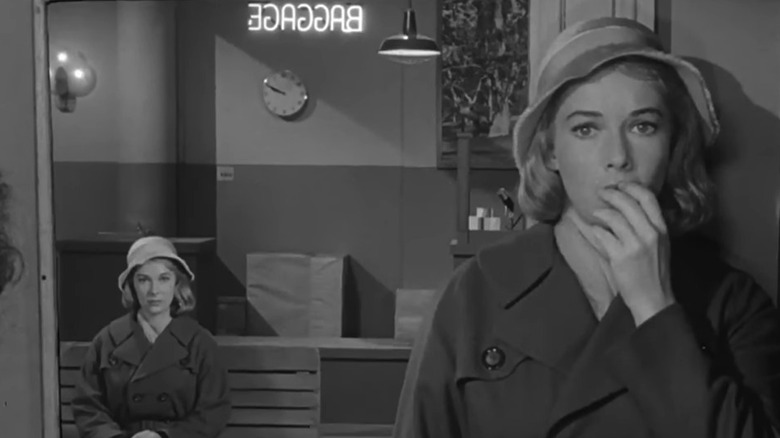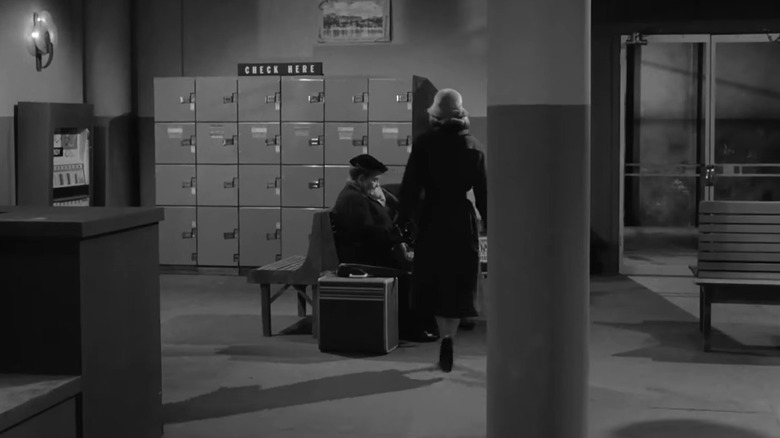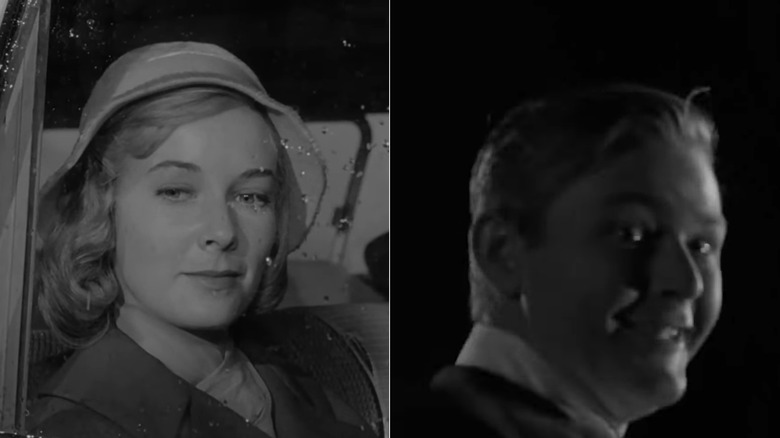How Rod Serling's (Almost) Doppelganger Sparked Early Ideas For The Twilight Zone
There's something about doppelgangers that's captivated the minds of so many speculative fiction writers over the years, from Edgar Allan Poe to David Lynch to Jordan Peele. At their core, these types of stories are popular because they provide such an easy opportunity to explore questions around identity. Who would you be if you'd grown up in a different environment? Doppelgängers can shed some light on that. Is having full self-awareness a virtue or a curse? Doppelgängers can help you figure that out. In a visual medium, there's the added benefit that doppelgänger storylines give actors the chance to really show off; it's hard to watch "Us," for instance, and not be amazed by Lupita Nyong'o's dual performance.
For Rod Serling, part of his inspiration for creating "The Twilight Zone" came from an experience of his a few years earlier. At some point in the late 1950s he found himself in a London airport, tired from travel, when he noticed a man nearby who looked and dressed almost exactly like him. "I kept staring and staring," Serling recalled, "with this funny, ice-cold feeling that, if he turns around and it's me, what do I do?"
Of course, it wasn't actually Serling's doppelgänger that was across the room, but the mere suggestion of the possibility — and the subsequent uncertainty that lasted until the man finally did turn around, revealing that he was not an exact double — was enough to get Serling thinking about ideas of other dimensions and parallel universes. It not only got him exploring otherworldly concepts on a weekly basis, but also led to him specifically tackling doppelgängers in his show's season 1 episode, "Mirror Image."
A spooky, liminal episode
"Mirror Image" takes place in a bus station in upstate New York — a station that is quiet and largely empty except for Millicent (Vera Miles) and Paul (Martin Milner), two strangers on their way to Buffalo. Although Serling chose a slightly different location from his real-life doppelgänger encounter, he still kept the story in a station for public transport. Airports, train stations, bus stations: they're all notable as places where your identity is irrelevant. It doesn't matter who you are or what you do for a living; you and nearly everyone around you are just fellow travelers, and nobody needs to know much more about you than that.
If this episode's any indication, these are also places where your identity is at its most vulnerable. This is a problem for Millicent, because stealing her identity seems to be what her mysterious counterpart is most interested in doing. What makes her even more vulnerable is that she's waiting for a bus to Buffalo specifically to start a new job there. She's in a transitional stage of life, and stuck in a transitional place. If anyone's gonna get stalked by a doppelgänger, it's gonna be her.
As liminal space scholars like video essayist Solar Sands have noted, places like bus stations function as channels to get you from one place to another, not really designed to be seen as a place in and of itself. When you're forced to dwell too long in these non-places, they start to feel a little eerie, a little unreal. Considering Rod Serling was stuck in one of these places during his doppelgänger run-in, it's no surprise he started thinking about some fifth dimension located outside of time and space. That's what all airports feel like when they're quiet.
A creepy conclusion
The episode ends with Paul deciding to call the police on Millicent and have her sent to a mental facility. He tells himself he did the right thing, only to discover his own malevolent doppelgänger shortly after. His copy disappears and Paul's left shouting "Who are you?!" into an empty street, but he never gets an answer. "Call it 'parallel planes' or just 'insanity,'" Serling's narrator explains, "Whatever it is, you'll find it in the Twilight Zone."
As for Millicent's character? We never follow up on her after she's dragged away by the police, so the most reasonable conclusion is that her doppelgänger has indeed successfully stolen her life. There's not really a lesson to this episode, but that's part of what makes it so haunting. Sometimes the world is just a cruel and scary place, for reasons that aren't really our fault.
But if you're looking for something to blame here, it seems like doubt is the real culprit. We meet Millicent in an uncertain time of her life, between jobs and moving to a brand new city. We don't know Paul's situation, but it seems like his life is much more certain throughout most of the episode. It's only after he calls the authorities on Millicent that he starts feeling some genuine uncertainty, and uncertainty is perhaps the most liminal, transitional emotion of all. It's the mental state everyone goes through as they move from one belief to another, and it's only when Paul's in this mental place (or non-place, one could say) that his doppelgänger appears. It turns out the Twilight Zone isn't just a place you can physically wander into; it's something you can bring upon yourself.


